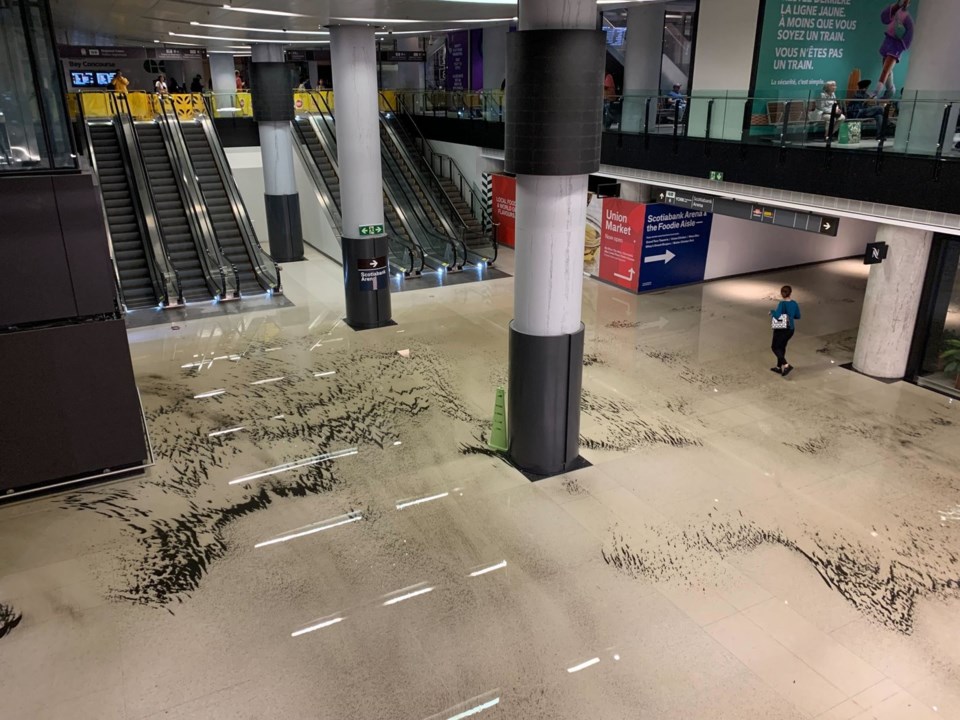Toronto must act to get ready for future storms, Mayor Olivia Chow said Wednesday, a day after a torrential downpour washed out major roads, flooded transit stops and left thousands without power.
Chow called Tuesday a "challenging day" for Canada's most populous city, telling reporters that the widespread flooding brought urgent focus on the upgrades needed to the city's ageing infrastructure.
"Weather events like this are going to occur more frequently because of climate change, and we must take action to build the resiliency of our city, and work to mitigate the impacts of these storms," Chow said.
Her comments echoed those made earlier Wednesday by Prime Minister Justin Trudeau, who while visiting Toronto also predicted communities should expect "more extreme weather events" due to climate change, urging investment "in resilient infrastructure that can handle what the future is holding."
Chow also restated her praise for a deal that sees the province take over repair and maintenance costs for two major highways -- the Gardiner Expressway and Don Valley Parkway. She said Toronto will save $2 billion from the deal, which can be put towards renewing infrastructure and enhancing preventative measures against future severe weather events.
Briefing alongside Chow, city manager Paul Johnson said the downpour in parts of Toronto "far exceeded" what was expected, and much of the city is "not designed" to handle such a massive amount of rainfall.
"The challenge is, we're improving our systems and the old infrastructure at the same time these events continue to happen," Johnson said, noting the city will analyze its flooding procedures and response.
"I think we need to separate out yesterday's event a little bit, which was a very unique circumstance ... from the fact that we get a lot of rain and a lot of water coming into the city on a regular basis year over year, and we're able to manage it."
Tuesday's deluge caused commuter havoc, with massive flooding shutting down several major routes and terminals, including Toronto's Union Station, Don Valley Parkway, and Lake Shore Boulevard. All have since reopened after the floodwaters dispersed.
The scale of the disruption was evident in a series of images showing washed out roads with cars nearly submerged in water.
The Toronto Paramedic Services said it brought two people to hospital with minor injuries linked to the extreme weather, but that it was not aware of any major injuries or deaths.
Communities around the Greater Toronto Area were also impacted.
In Mississauga, flooding forced the evacuation of about 113 residents from the Tyndall nursing home, the fire service said.
The Toronto and Region Conservation Authority said rivers and streams, as well as the Lake Ontario shoreline, have returned to normal water levels. At the height of the storm, more than 100 millimetres of rain was reported to have fallen in certain areas, it said.
Toronto Hydro spokesperson Daniel McNeil said around 3,000 customers remained without power Wednesday afternoon and restoration efforts with Hydro One are ongoing. He said as Hydro One restores power at the effected station, a small number of customers may experience intermittent outages.
Chow confirmed that service has been restored at all TTC stations. Service has also resumed on GO Transit, which operates regional trains and buses across the Greater Toronto Area, operator Metrolinx said.
City spokesperson Elise von Scheel said 311 handled more than 400 inquiries related to power outages or fallen or hanging power lines yesterday. The city service line also initiated more than 900 service requests for sewer lines, and more than 260 requests for reports of blocked or flooding catch basins, she said.
Rapper Drake was among the many Toronto residents impacted by the extreme weather, taking to Instagram to share a video of ankle-deep brown water flooding a room in his Bridle Path mega-mansion.
This report by The Canadian Press was first published July 17, 2024.
The Canadian Press



